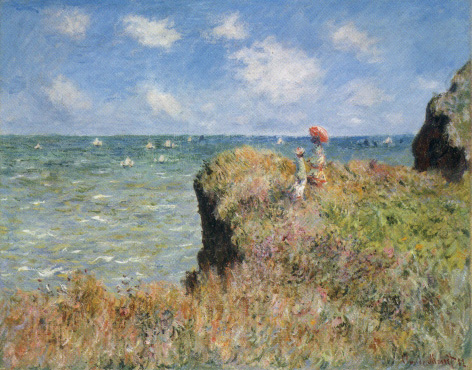 Tim Radford, The Address Book. London, U.K.: The Fourth Estate, 2012.
Tim Radford, The Address Book. London, U.K.: The Fourth Estate, 2012. Tim Radford, The Address Book. London, U.K.: The Fourth Estate, 2012.
Tim Radford, The Address Book. London, U.K.: The Fourth Estate, 2012.
![]()

Claude Monet, "The Cliff Walk at Pourville ," 1882. The Art Institute of Chicago.
The Address Book, p. 3.
2. "We live in a makeshift home with limited tenancy. It was more than a hundred million years in the making and it is due to be destroyed in a few billion years. . . . "
3. "Ultimately everything about me – glucose use in the cerebral cortex, for instance, or the mass of epidermis shed during a summer's day, or the blood pressure in my upper arm – can be described in terms that owe their origin to the arbitrary division of the sphere into meridian lines that girdle the planet and divide it into hemispheres."
pp. 137-138.
4. The geology of the Cretaceous period in the WEALD country
Cretaceous
"These beds, too, extended hundreds of metres downwards: their rock is now the Weald of Kent and Sussex, and they represent a long overture, a prelude, a period of marsh and mudflat, water meadow and tidal estuary, beach, dune and delta."
p. 43.
"The ancestors of modern butterflies and moths, the first ants, the first aphids, grasshoppers, and gall wasps appeared during the Cretaceous, and so did the first flowering plants."
Moorlands and estuary terrain were common in what is now the South Downs and weald countrysides.
p. 44.
"Words are instruments; they are tools."
p. 73.
"Words construct a reality for us, they are tools."
p. 80.
"This feeling of an enduring history is a tease."
deforestation of Sussex by the industrial revolution
p. 51.
The etymology of address, road, street,
The origin of the word: "address"
The uses by Milton and Hobbes of the word "address:"
in 1670 as
a "sense of direction,"
"by 1712 it had become the name and place to which a letter might be directed."
"We cannot understand a word properly until we learn its history, and when we do, it becomes more precious to us."
pp. 70-71.
tun is Saxon for town
pp. 71-72.
"A cottage comes from the medieval Latin word that described the home and garden of a feudal tenant, cotter or cottar; but the word cot for cottage, and cote, as in dovecote, already existed in old English, so at some point the Anglo-Saxon word was adopted by French feudal lords, Latinized, and handed back to the English householders."
p. 74.
"The words we use now, like the things we live in now, are just the visible ends of long threads through the tapestry of history."
cul de sac
means bottom of the bag in French, is "a thoroughfare open only at one end," meaning dead end.
"close" from enclosure and related to cloister by the Latin claudere, to close or shut something
"Words for house, and street, and road and cottage, county and country remind us that the land we live in is not, in any sensible way, ours by right, but by might."
p. 75.
p. 77.
"Words construct a reality for us, a phrase, a sentence, a paragraph at a time, a character and an episode at a time."
p. 8o.
The reality is that fiction is another country, not so easily separated from the one we think we live in, . . . "
p. 81.
![]()
Ordovician - collision, a fifty million year time span pieced together by rocks in Wales
Silurian - is the ending of the Iapetus Sea
p. 86.
Devonian -- "dunes of red sandstone." "characterized by baking-hot equatorial sands.
p. 87.
This Devon is on the equator: "but as the Devonian begins, there are no terrestrial vertebrates anywhere in this world. . . . Insects have yet to take flight."
p. 87.
Natural Theology: "the Earth itself was God's handiwork, and therefore bore undiscovered evidence of His craftsmanship."
"the Creator had also written another text that could be read , translated, argued, annotated, and admired"
p. 88.
"One of the most important of these pioneers was an Edinburgh farmer and physician called James Hutton and, he formulated the argument that processes that happened now had always happened, that the present was the key to the past, and that the paths of rivers, the shapes of mountains, the succession of rocks and the preservation of fossils could all be explained by the slow, uniform action of time wind, water, and processes driven by heat within the Earth."
the origins of geology in Scotland.
. . . "they had discovered time as well, a span of time so enormous that even they could at first hardly believe their own speculations."
p. 90-91, 93.
The "circumnavigator's paradox"
![]()
. . . "one of the first to develop the the idea that all life's variety branched continuously from one original stem, proposed that life emerged in a warm little pond, possibly from some soup of pre-existing proteins and other organic chemistry."
"In 1977 biologists were astonished to find living communities of animals – three hundred species at last count – living around volcanic vents, scratching a living ultimately from the superheated brines that gurgled up from the deep in the Earth's crust, miles below the ocean surface, without benefit of sunlight."
Accounting for the Transit of Venus across the face of the Sun
p. 170.
p. 88.
"The solar system is so enormous as to justify the term "unimaginable": the marvel is that people have imagined it., and imagined it very accurately, accurately enough to plan journeys to the most distant planets. . . . "
Tim Radford, p. 169.
![]()
![]()
 Tim Radford, The Address Book: Our Place in the Scheme of Things. London, U.K.: The Fourth Estate, 2011.
Tim Radford, The Address Book: Our Place in the Scheme of Things. London, U.K.: The Fourth Estate, 2011.